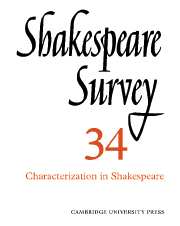Book contents
- Frontmatter
- Shakespeare’s Open Secret
- The Emergence of Character Criticism, 1774–1800
- Society and the Individual in Shakespeare’s Conception of Character
- Realistic Convention and Conventional Realism in Shakespeare
- On Expectation and Surprise: Shakespeare’s Construction of Character
- Shakespeare and the Ventriloquists
- The Rhetoric of Character Construction: Othello
- Characterizing Coriolanus
- The Ironic Reading of The Rape of Lucrece and the Problem of External Evidence
- The Unity of Romeo and Juliet
- No Abuse: The Prince and Falstaff in the Tavern Scenes of Henry IV
- Twelfth Night: The Experience of the Audience
- Plays and Playing in Twelfth Night
- Sceptical Visions: Shakespeare’s Tragedies and Jonson’s Comedies
- Shakespeare in Performance, 1980
- The Year's Contributions to Shakespearian Study 1 Critical Studies
- 2 Shakespeare’s Life, Times and Stage
- 3 Textual Studies
- Index
- Plate Section
2 - Shakespeare’s Life, Times and Stage
Published online by Cambridge University Press: 28 March 2007
- Frontmatter
- Shakespeare’s Open Secret
- The Emergence of Character Criticism, 1774–1800
- Society and the Individual in Shakespeare’s Conception of Character
- Realistic Convention and Conventional Realism in Shakespeare
- On Expectation and Surprise: Shakespeare’s Construction of Character
- Shakespeare and the Ventriloquists
- The Rhetoric of Character Construction: Othello
- Characterizing Coriolanus
- The Ironic Reading of The Rape of Lucrece and the Problem of External Evidence
- The Unity of Romeo and Juliet
- No Abuse: The Prince and Falstaff in the Tavern Scenes of Henry IV
- Twelfth Night: The Experience of the Audience
- Plays and Playing in Twelfth Night
- Sceptical Visions: Shakespeare’s Tragedies and Jonson’s Comedies
- Shakespeare in Performance, 1980
- The Year's Contributions to Shakespearian Study 1 Critical Studies
- 2 Shakespeare’s Life, Times and Stage
- 3 Textual Studies
- Index
- Plate Section
Summary
By far the most exciting book I have read in the last twelve months within the general category of ‘Life, Times and Stage’ is Philip Edwards’s masterly study of Elizabethan and Irish drama in relation to emergent nationalism. Most of the material which the author considers, whether plays or masques on the one hand or historical information on the other, is thoroughly familiar, which makes his achievement in juxtaposing them to make them yield new insights into both drama and history all the more striking. Among the many fine things in the book is an excellent account of court masque with a keen-edged discussion of flattery and the moral problems raised by it for Jonson as masque-maker, as well as the connection between the ‘flattering’ and the ‘nonflattering’ works. This occurs within a widerranging inquiry into the way in which Jonson ‘theorized on, dramatized and lived out his view of the relationship between prince and poet’ which illustrates very well Professor Edwards’s gift for setting familiar material in a new and revealing light. Similarly stimulating is the comment that in The Tempest Shakespeare finds room for both epic and burlesque views of colonization, or that in the Histories national pride is transformed from belief into longing, or the inquiry prompted by the question: why, around 1630, should two of England’s leading dramatists (Massinger and Ford) choose to write a play sympathetic to a defeated pretender to the throne?
- Type
- Chapter
- Information
- Shakespeare Survey , pp. 177 - 187Publisher: Cambridge University PressPrint publication year: 1982



